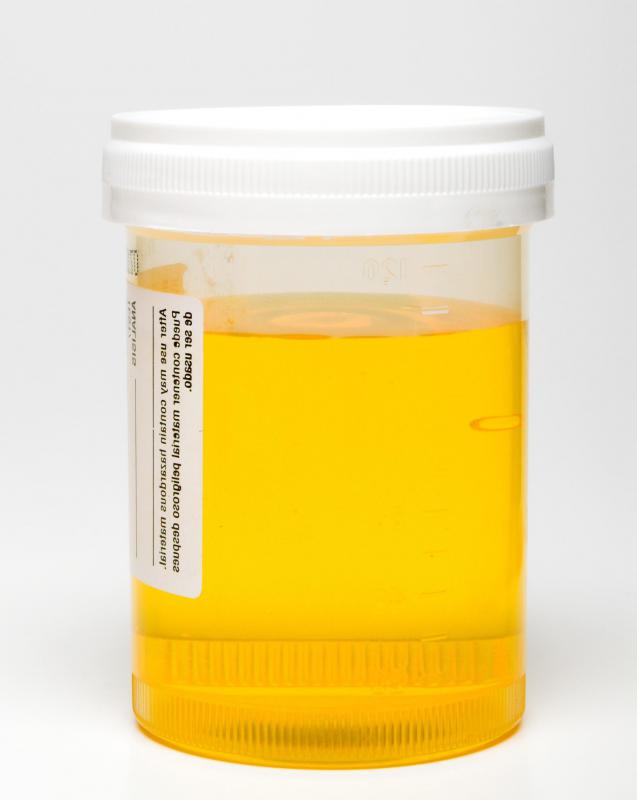At TheHealthBoard, we're committed to delivering accurate, trustworthy information. Our expert-authored content is rigorously fact-checked and sourced from credible authorities. Discover how we uphold the highest standards in providing you with reliable knowledge.
What Does a Positive Urinalysis Mean?
A positive urinalysis is an inspection of a urine sample that yields a positive result for whatever the technician was looking for in the sample. In addition to reporting on whether a result is positive or negative, the technician may also provide information about the concentration of compounds found in the sample, as this information may be relevant to the findings. The report can also discuss the urine pH and other measurements taken during the test to provide a complete profile on the sample.
Positive results may be good or bad, depending on what they show. In the case of a urinalysis for drugs, a positive urinalysis is not desirable, as it indicates the technician found evidence of drug use. Conversely, in a test to determine if a patient is responding to treatment, a positive result might indicate a good concentration of metabolites in the urine, indicating that the kidneys are working properly and the patient is doing better.

At the time a patient gives a urinalysis sample, a technician will affix a tag to the container to track it. In drug testing for employment, sports, and other activities, the samples are carefully controlled to prevent contamination, sample swaps, and other issues. In the lab, the pathologist can subject the sample to a series of tests to check for specific compounds of interest, according to the orders of the doctor.

When a lab identifies a positive urinalysis result, it carefully documents it and may repeat the test to confirm. This can be important when the result could have substantial implications for the patient, as in the case of a drug test. The lab will report not just the result, but information about who performed the test, when, and where. It is possible to ask to inspect the lab manual to learn more about the procedures used in that facility, and to request a retest if there are doubts or concerns about a positive urinalysis result.

When a doctor requests a urinalysis, she may not report the results to the patient unless they require further action. Patients who want to know about the results should ask the doctor or a staff member like a nurse to call when the results come in to discuss them. In the case of a positive urinalysis, patients usually receive a call to talk about it and may have to come in to the office to discuss their options.
AS FEATURED ON:
AS FEATURED ON:















Discussion Comments
@Grivusangel -- That is pretty extreme, but as you said, is probably necessary to keep people from trying to alter the test results.
I really hate the whole urinalysis process. It's annoying to have to pee in the cup, then you have to clean up yourself and the cup, and preferably, drink a bottle of water on the way over to plump up your veins, and give your kidneys something to do so you can actually produce a specimen.
I always like to know in advance if they want a urine on me so I can make sure I drink a lot of fluid. I try to anyway; as I said, it pumps up my veins and makes them easier to access.
I had to have a drug test so I could claim workman's comp for my shoulder -- repetitive motion injury. Turned out I had an inflamed trapezius.
Anyway, the procedure was pretty ridiculous. I had to leave my purse at the desk, get the specimen cup and go into the stall. A woman actually waited in the bathroom with me! As soon as I finished, I had to wipe and leave the stall, without flushing the toilet, and hand the cup to the woman.
I'm sure it was to keep the test from being compromised, but wow. Not that I had anything to worry about. I don't do drugs and had only been taking ibuprofen.
Post your comments